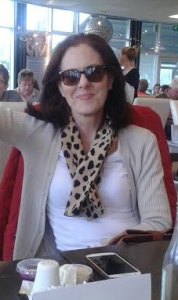 It’s terrifying to really look cancer in the eye, it requires bravery and fearlessness but most of all it requires time. Time to absorb, process and compartmentalise everything your doctor has told you. Time to let your head stop spinning and regain composure. Time to stop being afraid of words.
It’s terrifying to really look cancer in the eye, it requires bravery and fearlessness but most of all it requires time. Time to absorb, process and compartmentalise everything your doctor has told you. Time to let your head stop spinning and regain composure. Time to stop being afraid of words.
We underestimate the power of words. In my experience it’s the wonderful people who work in healthcare that make it bearable when you’re sick. Everyone from the nurses, doctors, chatty dinner ladies, admin staff and chirpy porters. But even surrounded by such lovely people little things like words have the power to terrify. Words made me physically recoil everytime a doctor came to my bedside with the latest scan or biopsy result when I was first admitted to Naas hospital. “We’ve found a small polop, it’s causing a blockage and this is what’s making you feel unwell”. Ok I’m comfortable with the word polop, sounds inocuous enough almost friendly. “We’ve taken a biopsy so that we can see exactly what we’re dealing with, there’s no need to worry it’s probably benign“. Less friendly words that begin to make me nervous. One of the medical team then casually mentions a mass .. “we need to examine it, see what the spores are like and if it has spread”. Instinctively I feel I know where this is going and even as the smiling dinner lady brings my lunch I’m terrified. Terrified of more words. Eventually a member of the team uses the word growth. What started out as a friendly polop has now become a growth. There’s only one word remaining.
“You can’t enter into this feeling fear” I tell myself. “You’ve got to find a way of seeing each doctor that comes to your bedside with the latest test results as someone who is trying their best to fix you”. “You need to stop being afraid of the word tumour“
I was soon transferred to Tallaght hospital (as a medical emergency) where I met my surgeon Professor Paul Ridgway for the first time. He was friendly and extremely polite but matter of fact. “Hi I’m Paul, Paul Ridgway I’ll be looking after you – which do you want first, the good news or the bad news?” “Good news please” I replied. “Ok, good news is I’ll be discharging you within the next day or two, the bad news is you’ll be back within two to three weeks for surgery. This won’t be just keyhole surgery, unfortunately it will be major open surgery. You don’t have an option. You need to prepare for ten days in hospital with several days in our high dependency unit immediately after surgery. Post surgery recovery will be a minimum of six to eight weeks. I’m waiting on biopsy results to see exactly what I’m dealing with here. But I will be removing the growth that we’ve found, along with your gallbladder and most probably a section of both your pancreas and your duodenum which is part of your stomach. My secretary will organise a meeting for next week and I’ll go through everything in more detail then. It would be wise to bring a family member with you for this meeting. Any questions?”. Well holy crap.. that’s some introduction, succinct and swift. Feeling like I’d just been pummeled with a blunt instrument I managed to compose myself but couldn’t think of a single intelligent question to ask. “OK thank you” was all I recall saying “so your secretary will be in touch and I’ll see you next week”. Remarkably still no mention of tumours or cancer. We did meet the following week as planned and one week later again I had surgery!
It was at my post surgery outpatient appointment that Professor Paul Ridgway first used the words tumour and cancer. Yes there had been rumblings and references to early stage cell changes and a hurried mention of possible follow on chemotherapy treatment all of which I compartmentalised mentally but remained accutely aware of. Throughout this whole process Professor Ridgway has been excellent at choosing the most sensitive words and feeding me the right information each step of the way but I realise now that that’s his job. He’s responsible for getting me through the surgery stage successfully so that I’m healthy and ready for the chemotherapy stage. Or maybe he is simply experienced enough to pick up on my reluctance to ask too many questions, to Google anything or to query the details. He left it as late as possible to use those words he knew would be most terrifying, maybe he understands the power of words.
